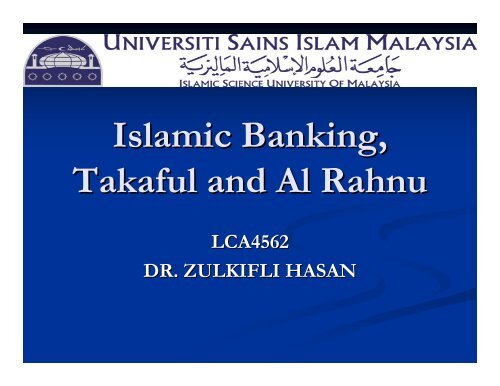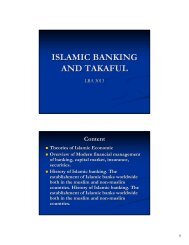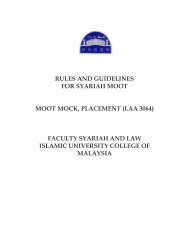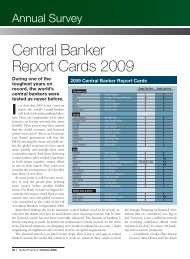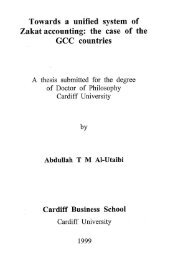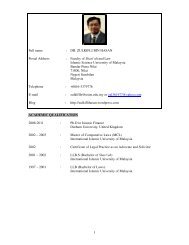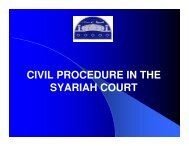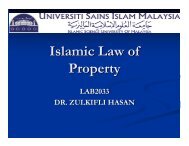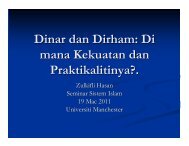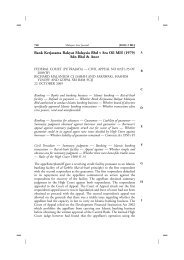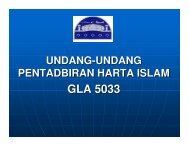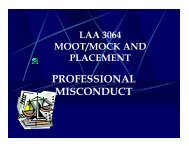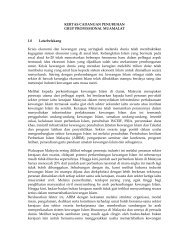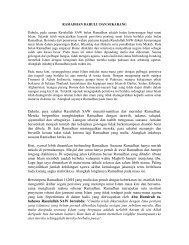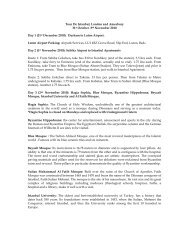Islamic Banking, Takaful and Al Rahnu
Islamic Banking, Takaful and Al Rahnu
Islamic Banking, Takaful and Al Rahnu
Create successful ePaper yourself
Turn your PDF publications into a flip-book with our unique Google optimized e-Paper software.
<strong>Islamic</strong> <strong>Banking</strong>,<br />
<strong>Takaful</strong> <strong>and</strong> <strong>Al</strong> <strong>Rahnu</strong><br />
LCA4562<br />
DR. ZULKIFLI HASAN
Contents<br />
Pawnbroking<br />
<strong>Al</strong> <strong>Rahnu</strong>
Pawnbroking<br />
the business of advancing loans that are secured<br />
against pledges of personal assets.<br />
Those assets could include anything from<br />
jewellery, , diamonds, watches, <strong>and</strong> gold, to silver,<br />
antiques, <strong>and</strong> fine artwork.<br />
No credit checks<br />
• Confidential service<br />
• Instant cash<br />
• Retain ownership of the valuable items
What’s s wrong with conventional<br />
Pawnbroking<br />
higher interest rates<br />
usurious<br />
exploitative activities<br />
the decreasing value of pawned goods<br />
low collateral value during the valuation process
Historical Background of <strong>Al</strong> <strong>Rahnu</strong><br />
The first <strong>Islamic</strong> pawn-broking institution,<br />
Mu'assasah Gadaian Islam Terengganu (MGIT),<br />
was set up by the Majlis Agama Islam dan Adat<br />
Istiadat Terengganu in January 1992.<br />
In March 1992, Kedai <strong>Al</strong>-Rahn<br />
(KAR), a subsidiary<br />
of Permodalan Kelantan Berhad.<br />
On 21 August 1993, the MOF announced the Skim<br />
<strong>Al</strong>-<strong>Rahnu</strong><br />
through the collaboration of three<br />
institutions namely BNM, YPEIM <strong>and</strong> BKRM<br />
1997: BIMB<br />
2002: EON bank <strong>and</strong> AGRO bank
verse 283 of Surah al-Baqarah<br />
Baqarah:<br />
(And if you are on a journey <strong>and</strong> can not find a<br />
scribe then let there be a pledge taken<br />
(mortgaging) then if one of you entrusts the<br />
other, let the one who is entrusted discharge his<br />
trust faithfully <strong>and</strong> let him be afraid of <strong>Al</strong>lah, his<br />
lord. And conceal not the evidence for he who<br />
hides it. Surely his heart is sinful. And <strong>Al</strong>lah is<br />
<strong>Al</strong>l-knower of what you do).
Narrated Aishah r.a the prophet s.a.w. . bought<br />
foodstuff on credit for a limited period <strong>and</strong><br />
mortgaged his armour for it [sahih[<br />
<strong>Al</strong>-Bukhari<br />
Bukhari,<br />
3/2509].
What is <strong>Al</strong> <strong>Rahnu</strong><br />
<strong>Al</strong>-<strong>Rahnu</strong><br />
or pawn-broking is an activity whereby a<br />
valuable item is collateralised to a debt which may<br />
be utilised as payment should the debt is not<br />
repaid within the agreed period. In the event the<br />
debtor is not able to repay the debt, the pawned<br />
asset will be sold off to settle the outst<strong>and</strong>ing debt<br />
<strong>and</strong> any surplus will be given back to the owner of<br />
the asset. However, if the owner of the asset could<br />
not be traced, it is the responsibility of the <strong>Islamic</strong><br />
pawn-broker to place the fund in the Baitulmal<br />
account for future savings should any claims be<br />
made for the surplus by the owner or his heir.
<strong>Al</strong> <strong>Rahnu</strong><br />
A combination of three concepts is applied for<br />
the short-term term financing under <strong>Islamic</strong> pawn-<br />
broking, i.e. Qardhul Hasan (benevolent loan),<br />
<strong>Al</strong>-<strong>Rahnu</strong><br />
<strong>and</strong> <strong>Al</strong>-Wadiah<br />
(custodian).
(1) Qardhul Hasan<br />
A bank will grant a benevolent loan to the<br />
applicant who wishes to pawn his valuable item.<br />
The loan will be issued under the concept of<br />
Qardhul Hasan, , whereby the customer is only<br />
required to pay the amount borrowed;
(2) <strong>Al</strong>-<strong>Rahnu</strong><br />
Pledge or security related to loan.<br />
Prior to disbursment of cash to the applicant,<br />
the applicant is required to place a valuable asset<br />
as collateral for the loan extended by the bank;
(3) <strong>Al</strong>-Wadiah<br />
The bank accepts custody of the valuable asset<br />
on a Wadiah concept whereby the bank<br />
promises to keep the valuable asset in a safe<br />
place. The bank will need to take precautionary<br />
measure such as providing security <strong>and</strong><br />
insurance to ensure its safe returns once the<br />
customer pays his debt. Under the Wadiah<br />
concept, the bank will charge the customer for<br />
the services rendered in keeping the valuable<br />
asset.
<strong>Al</strong> <strong>Rahnu</strong><br />
The borrower (<strong>Al</strong>-Rahin<br />
Rahin) ) submits an item (gold) for<br />
pawning to the lender (<strong>Al</strong>-Murtahin<br />
Murtahin) ) as the collateral from<br />
which the borrower (<strong>Al</strong>-Rahin<br />
Rahin) ) receives an interest-free<br />
loan amounting to 60% of the pawned item.<br />
The collateral item is held by the lender <strong>and</strong> a storage fee<br />
is charged to the lender during the period of the loan.<br />
The loan is paid in full or in installment after the maturity<br />
date <strong>and</strong> the lender must return the collateral or the item<br />
to the owner.<br />
In the event of a default on the loan by the borrower; the<br />
item is then auctioned.<br />
The money gained from the auction of the item is used to<br />
pay the defaulted loan <strong>and</strong> outst<strong>and</strong>ing storage fees, while<br />
what is let over is given to the borrower
Advantages<br />
1. Easy access to credit facility provided the<br />
customer posses the respective recognized<br />
asset by the credit granter/financier.<br />
Through Ar-<strong>Rahnu</strong><br />
financing, the financial<br />
institution is not strict on the credit history or<br />
creditworthiness of the clients. The financing<br />
is not based on the customer’s s income as the<br />
case of an ordinary personal loan.<br />
The<br />
important consideration for the granting of the<br />
facility is the item pledged itself.<br />
The items<br />
will be valued <strong>and</strong> will be the basis of amount<br />
granted for the finance.
2. Items/assets assigned to the financier will be<br />
returned once payment is made for the amount<br />
borrowed.<br />
The assets which are pledged to the financial<br />
institution will be returned back to the client<br />
provided that payment is made for the amount<br />
lend by the financial institution together with the<br />
safekeeping fee (rental charges). In a sense<br />
money is not created by the financial out of thin<br />
air but in exchange for the value of the asset<br />
(items pledged).
3. In event of inability to pay, the asset will be sold<br />
<strong>and</strong> amount above the borrowed amount <strong>and</strong> rental<br />
fee will be returned to the customer<br />
In the events of defaults <strong>and</strong> inability of the customer<br />
to pay the amount borrowed, the items will be<br />
auctioned with the market gold value as the reserved<br />
price. Proceeds from the auction will be used to<br />
settle off the amount borrowed together with the<br />
safekeeping fee. The balance of the amount after<br />
deducting the borrowed sum <strong>and</strong> payment of related<br />
fees will be given to the customers. This is normally<br />
the case as the initial financing is only given base on a<br />
maximum of 60 percent of the items value.
4. The items assigned to financier are gold, thus value<br />
will be stable <strong>and</strong> fluctuation in gold value is not erratic.<br />
The pledged items are in gold of different grades.<br />
Unlike other asset such as houses or cars, gold value is<br />
more stable as fluctuation of its value is not erratic. As<br />
been observed property value such as houses can be<br />
high in a period <strong>and</strong> may be low in another. Cars on<br />
the other h<strong>and</strong> depreciate highly especially after the first<br />
year (such an example is a first h<strong>and</strong> car). With respect<br />
to the stable gold value both the financier <strong>and</strong> the<br />
customers will not be exposed to a high risk in the<br />
event of such items needs to be auctioned off.
5. Less/No risk from fluctuating interest rate<br />
as the facility is not associated with interest<br />
rate.<br />
Another advantage of the financing facility is<br />
that the facility is not as much related to any<br />
changes in the market interest rates. The main<br />
exposure of the financing facility is the value<br />
of gold rather then the prevailing interest<br />
rate.<br />
The main income to the financier will<br />
be in the form of documentation/processing<br />
fees <strong>and</strong> safekeeping (rental) fees.
6. Contribution on social welfare of the<br />
society eradicating unjust pawning<br />
In the normal pawning activity, the items pawned are<br />
surrendered totally to the pawn shop <strong>and</strong> ownership<br />
is transferred to the shop. If the owner wanted to<br />
redeem the items, he/she have to pay a much higher<br />
price for the items compared to the initial pledged<br />
amount. The valuation of the items is also subjective,<br />
as it I based on the pawn shop valuation of the items<br />
<strong>and</strong> not based on the real value of the items. By Ar<br />
<strong>Rahnu</strong> facility the owner of the items can have access<br />
to funds while at the same time redeem the items<br />
with the respective amount borrowed through with<br />
the payment of the safekeeping fee. Valuation is also<br />
made based on the value of the gold item rather then<br />
subjective valuation.
Disadvantages<br />
1. <strong>Takaful</strong> bore by the financier for safekeeping of the<br />
assets/items: The amount covered is the whole value of the<br />
items (though initially financing is only given to a maximum of<br />
60 percent of the gold value).<br />
2. Customer need to have assets particularly in gold: For those<br />
whom do not have these items, they are not eligible to subscribe<br />
to this product.<br />
3. Disadvantage if initial contract on higher gold value <strong>and</strong><br />
auction is made on a lower gold value: should the future price of<br />
gold decreases <strong>and</strong> at the same time the customer are not able to<br />
repay the amount, the reserve price of the gold will be at a lower<br />
market value.<br />
4. Associations of rental / safekeeping fees with the financing:<br />
Association of rental fees with the advanced amount might lead<br />
to the underst<strong>and</strong>ing that the monthly rental fee/charge is<br />
indirectly based on some percentage of the financing<br />
amount. This is similar to conventional finance where the<br />
charges (interest) is based on the principal amount lend.
Fatwa on al <strong>Rahnu</strong><br />
The 77th Muzakarah of the Fatwa Committee of the National<br />
Council held on 10th -12th April 2007:<br />
1. The working capital for <strong>Islamic</strong> pawn broking shop (ar(<br />
ar-Rahn)<br />
must be gained from <strong>Islamic</strong> banks or lawful (halal(<br />
halal) ) sources <strong>and</strong><br />
free from usury(riba), gambling, uncertainties (gharar(<br />
gharar) ) <strong>and</strong> other<br />
activities that do not meet the Shariah requirements<br />
2. The pawnbroker should subscribe to <strong>Islamic</strong> insurance<br />
coverage <strong>and</strong> is not allowed to get involved with conventional<br />
insurance<br />
3. If the collateral is lost, stolen, damaged or alike, the<br />
pawnbroker has to pay compensation for the remaining value of<br />
the collateral at the time of valuation<br />
4. The pawnbroker should appoint internal Syariah legal advisor<br />
to supervise the operation <strong>and</strong> activities of ar-rahn<br />
rahn.
Parameters of of al <strong>Rahnu</strong><br />
1. The borrower (<strong>Al</strong>-rahin<br />
rahin) ) should submit the item<br />
or the collateral to the lender (<strong>Al</strong>-murtahin<br />
murtahin), where<br />
the lender can forgo the item (like returning back<br />
to the borrower) but not vice-versa.<br />
versa.<br />
2. Any property which can not be traded according<br />
to the syariah law can not be used as <strong>Al</strong>-rahnu<br />
rahnu.<br />
3. The borrower must pay the loan after the<br />
maturity date <strong>and</strong> the lender must return the<br />
collateral or the item to the owner. If the borrower<br />
fails to repay the loan, the lender receives the right<br />
to recover his loan form the collateral <strong>and</strong> he must<br />
return to the borrower if any thing remained.
4. The lender is responsible for the collateral for<br />
any damage caused by his wrong doings but not<br />
otherwise <strong>and</strong> in the later case the borrower<br />
remains owing the loan to the lender.<br />
5. The collateral (<strong>Al</strong>-rahn<br />
rahn) ) can be submitted to<br />
third party if both sides have confidence with<br />
him.<br />
6. If the borrower rejects the selling of the<br />
collateral in the case of default or the lender<br />
conditions that he will take the collateral if the<br />
borrower default to pay him such transactions<br />
can not be counted as <strong>Al</strong>-rahnu<br />
rahnu.
7. If both sides disagree how much the loan was<br />
the judge will consider the words of the<br />
borrower with swearing unless the lender comes<br />
with evidence.<br />
8. If the lender claims that he returned the<br />
collateral to the borrower <strong>and</strong> the borrower<br />
rejects the latter's words will be considered with<br />
swearing unless the lender comes with evidence.<br />
9. The lender can get a benefit from the pledged<br />
assets if they were submitted as collateral for<br />
example he can raid the horse or use the milk of<br />
the cow by feeding them but he should be fair<br />
so he can not use more what he spent on them.
10. If the lender feeds the animal in the case used as <strong>Al</strong>-<br />
rahn without the information <strong>and</strong> acceptance of the<br />
borrower he can't claim any thing about that.<br />
11. If the lender maintains the collateral for example like<br />
when the house collapses or close to collapse <strong>and</strong> is<br />
maintained by the lender. The letter can claim the<br />
irremovable things such as stones <strong>and</strong> woods where it is<br />
impossible to remove from the house.<br />
12. If the borrower dies or become bankrupt, the lender<br />
should be privileged among other lenders. He has a right<br />
to sell the collateral to discover his loan if the collateral is<br />
not enough for the loan he will remain one of those<br />
waiting repayment from what the dead man has left or<br />
the bankrupted borrower still owns
<strong>Al</strong> <strong>Rahnu</strong> Products<br />
YPEIM<br />
Agro Bank<br />
Bank Rakyat<br />
BIMB<br />
Affin <strong>Islamic</strong> Bank
<strong>Al</strong> <strong>Rahnu</strong><br />
Collateral: Only gold<br />
Margin: rm10k-rm25k rm25k or not more than 65% of<br />
the collateral value.<br />
Period: 6 months
Collateral<br />
In the <strong>Islamic</strong>-based pawnshop, gold is the only<br />
permitted item.<br />
Firstly, gold is easily resold <strong>and</strong> so there is potentially<br />
auctioning the collateral should the borrower not<br />
redeem the pledge.<br />
Secondly, gold’s purity can be easily determined <strong>and</strong> so<br />
the risk of mispricing the collateral can be minimized.<br />
Thirdly, gold chains <strong>and</strong> rings typically require only a<br />
small flat envelop for storage <strong>and</strong> so can be kept<br />
securely in the bank safe at little additional cost.<br />
Finally, women often receive gold chains <strong>and</strong> bracelets<br />
as wedding gifts <strong>and</strong> generally retain personal<br />
ownership of these items especially in Malaysia
Safekeeping Fees<br />
The storage fee is based on the value of gold <strong>and</strong> not<br />
on the amount of the loan,<br />
RM100.00 – for the first 3 months is 0.60% per month<br />
RM1, 000.00 – for the next 3 months is 0.70% per<br />
month<br />
RM1, 001.00 – for first 3 month is 0.65% per month<br />
RM 5, 000.00 – for the next 3 month is 0.80% per<br />
month<br />
RM5, 001.00 – for the first 3 months is 0.80% per<br />
month<br />
RM10,000.00 – for the next 3 months is 0.90% per<br />
month
Asset value<br />
RM1-RM400<br />
RM1-RM1,000<br />
RM401-<br />
RM2,000<br />
Safekeeping Fees<br />
PMK<br />
0.65<br />
BKRM<br />
0.60<br />
0.85<br />
MGIT<br />
No charge<br />
No charge<br />
No charge<br />
RM1,001-<br />
RM5,000<br />
0.75<br />
0.95<br />
No charge<br />
RM5,001-<br />
RM50,000<br />
0.75<br />
No charge
Legal Frameworks<br />
S 46 of the Pawnbrokers Act 1972: The following<br />
persons shall be exempted from the provisions<br />
of this Act—<br />
(a) any bank licensed to carry on banking business in<br />
Malaysia;<br />
(b) Bank Pertanian Malaysia established under the Bank<br />
Pertanian Malaysia Act 1969 [Act 9]; <strong>and</strong><br />
(c) any co-operative operative society registered under any written<br />
law in force in Malaysia relating to co-operative<br />
operative<br />
societies.
Legal Frameworks<br />
<strong>Al</strong>-rahnu scheme in BKRM is subject to different acts:-<br />
1. the Bank Kerjasama Rakyat (M) Berhad Act 1978,<br />
2. the Co-operative Societies Act (1993)<br />
3. the Development Finance Institutions Act 2002.<br />
4. Occupational Safety <strong>and</strong> Health Act for workers who<br />
are exposed to acid for the gold test <strong>and</strong> the Weight<br />
<strong>and</strong> Measurement Act, in which the gold weighing<br />
device has to be licensed every year.
Operational Aspect<br />
<strong>Islamic</strong> pawnbrokers would prefer the customer to<br />
redeem their collateral within 6 months. However, if<br />
there is no repayment, there is an extension period of 3<br />
months after which the client is informed that the item<br />
will be sold by auction within a further of 2 months<br />
period.<br />
any surplus from the sale of the gold over the amount<br />
owed to the pawnbroker, including accumulated<br />
deposit fee <strong>and</strong> any costs related to the sale, has to be<br />
returned to the customer. In case the customer cannot<br />
be located, the surplus will be forwarded to the<br />
Baitulmal from which the customer is entitled to make<br />
future claims.
Syariah Issue<br />
1. maintenance of the pledged asset<br />
Upon the borrower<br />
The lender can not make profit out of it.
Syariah issue<br />
2. al intifa bi al marhun<br />
The lender can not use the pledged asset except<br />
with permission
Syariah issue<br />
3. safekeeping fees.<br />
Fees must be actual cost<br />
The lender however makes profit through this<br />
fees.<br />
Eg. Loan RM5000.00 pledged asset value<br />
RM10000.00, fees, (RM0.45 × 100 = RM45.00).<br />
If 6 months RM270.00 (RM45.00 × 6 =<br />
RM270.00).
Thank You<br />
Dr. Zulkifli Bin Hasan<br />
E-mail:<br />
zulkiflih@admin.kuim.edu.my<br />
E-mail:<br />
zul361977@yahoo.com.<br />
Tel. No: 06-7988455<br />
Mobile: 0163379776


